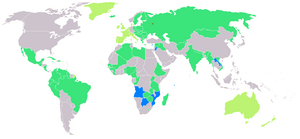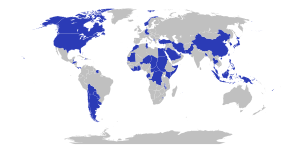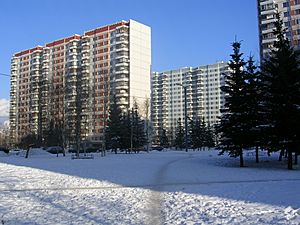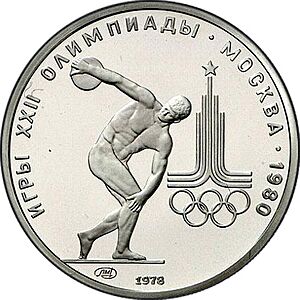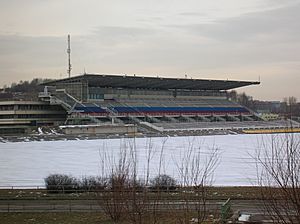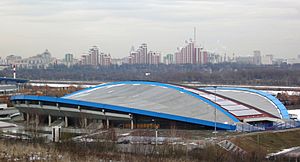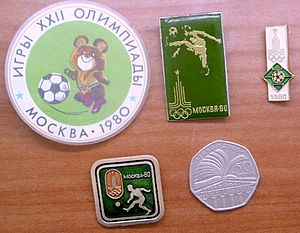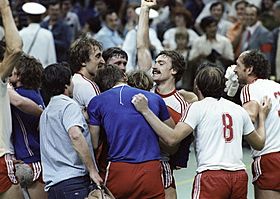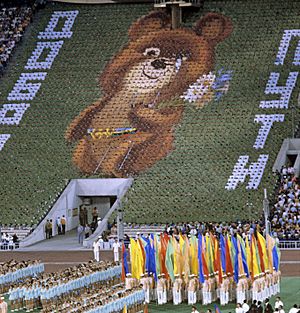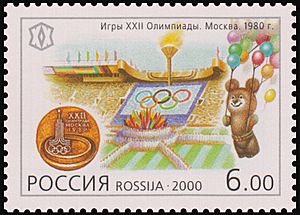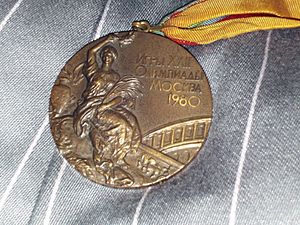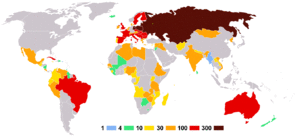1980 Summer Olympics facts for kids
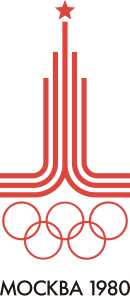
Emblem of the 1980 Summer Olympics
|
|||
| Host city | Moscow, Russian SFSR, Soviet Union (present-day Russian Federation) | ||
|---|---|---|---|
| Nations | 80 | ||
| Athletes | 5,256 (4,137 men, 1,119 women) | ||
| Events | 203 in 21 sports (27 disciplines) | ||
| Opening | 19 July 1980 | ||
| Closing | 3 August 1980 | ||
| Opened by | |||
| Cauldron | |||
| Stadium | Grand Arena of the Central Lenin Stadium | ||
| Summer | |||
|
|||
| Winter | |||
|
|||
The 1980 Summer Olympics, also known as the Games of the XXII Olympiad, took place in Moscow, Soviet Union (which is now Russia). These games were held from July 19 to August 3, 1980. It was the first time the Olympic Games were held in an Eastern Bloc country. It was also the first and only Summer Olympics in a country where people speak a Slavic language.
Eighty countries participated in the Moscow Games. This was the smallest number of countries since the 1956 Summer Olympics. Many countries, led by the United States, chose not to attend. This was because of a conflict called the Soviet–Afghan War. Some athletes from countries that did not officially boycott still competed. They marched under the Olympic Flag instead of their own country's flag. Later, the Soviet Union did not attend the 1984 Summer Olympics in Los Angeles. The Soviet Union won the most medals overall. They also won the most gold medals, with East Germany also winning many.
Contents
Choosing the Host City
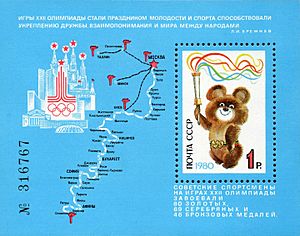
Only two cities wanted to host the 1980 Summer Olympics: Moscow and Los Angeles. The decision was made in Vienna, Austria, on October 23, 1974. Los Angeles later hosted the 1984 Summer Olympics.
| City | Country | Votes |
|---|---|---|
| Moscow | 39 | |
| Los Angeles | 20 | |
| Abstentions | 2 | |
Who Participated and Why Some Countries Didn't
Eighty countries took part in the Moscow Olympics. This was the lowest number since 1956. Seven countries competed for the very first time: Angola, Botswana, Cyprus, Jordan, Laos, Mozambique, and Seychelles. None of these new nations won any medals.
The 1980 Summer Olympics faced a large boycott. Many countries, led by the United States, decided not to participate. This was a protest against the Soviet Union's actions in Afghanistan in 1979. President Jimmy Carter of the U.S. said his country would boycott if Soviet troops did not leave Afghanistan. About 65 countries and regions did not come to the Games. Some followed the U.S. boycott, while others said they couldn't afford to participate.
Many countries that boycotted the Moscow Games instead took part in the Liberty Bell Classic in Philadelphia. Even with the boycott, the countries that did compete had won a large share of medals in previous Olympics. This was partly because some countries, especially in the Eastern Bloc, had special training programs for their athletes.
As a way to protest, fifteen countries marched in the Opening Ceremony with the Olympic Flag. They did not use their national flags. The Olympic Flag and Olympic Hymn were also used during medal ceremonies for these athletes. Athletes from New Zealand, Portugal, and Spain competed under their own National Olympic Committee flags.
The boycott affected sports like swimming, track and field, boxing, and basketball. Most of the medals were won by the Soviet Union and East Germany.
Events and New Records
The 1980 Games had 203 events, more than any Olympics before. Athletes set 36 world records, 39 European records, and 74 Olympic records. In total, more records were broken than at the Montreal Olympics. New Olympic records were set 241 times, and world records were broken 97 times.
Media Coverage
Major TV and radio stations from the Soviet Union, Europe, and other parts of the world covered the Games. NBC in the U.S. had planned to be a big broadcaster. However, they canceled most of their coverage because of the U.S. boycott. They still showed highlights and summaries. This was also the first time North Korea watched the Olympics on TV.
Spectators and Souvenirs
Five million people came to watch the Games. This was 1.5 million more than at the Montreal Games. There were 1,245 judges from 78 countries. The Soviet Union released a series of special coins from 1977 to 1980 to celebrate the event. These coins were made of platinum, gold, silver, and copper-nickel.
Budget and Costs
The official report said that preparing and holding the 1980 Games cost about US$1,350,000,000. The Games earned about US$231,000,000. To help pay for the Games, the organizers held Olympic lotteries. Money from these lotteries covered 25% of the costs.
The Oxford Olympics Study estimated the total cost of the Moscow 1980 Summer Olympics at US$6.3 billion in 2015 dollars. This amount only includes costs directly related to sports, like building venues and the Olympic village. It does not include costs for things like roads or hotels.
Highlights of the Events
Archery
- Tomi Poikolainen from Finland won the men's archery gold medal. He scored 2455 points, just three points more than a Soviet athlete.
- The women's archery gold medal went to Ketevan Losaberidze from the USSR. She was also a European, Soviet, and world champion.
- Natalia Butuzova (USSR) won the women's archery silver medal. She had set many national and world records in 1979.
Athletics
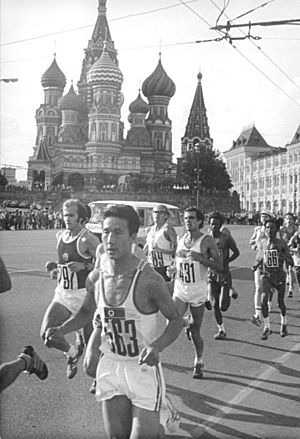
- Ethiopian runner Miruts Yifter won both the 5,000 metres and 10,000 metres races. He was following in the footsteps of Lasse Virén who did the same in 1972 and 1976.
- Steve Ovett of Great Britain won the 800 metres gold medal, beating world-record holder Sebastian Coe. Coe then won the 1,500 metres race, with Ovett finishing third.
- Allan Wells from Great Britain won the 100 metres race. He was the first Briton since 1924 to win this event.
- Gerd Wessig from East Germany won the high jump with a jump of 2.36 metres. This was 9 cm higher than he had ever jumped before.
- Soviet jumper Tatiana Kolpakova set a new Olympic record in the women's long jump with 7.06 metres.
- Poland's Władysław Kozakiewicz won the pole vault with a jump of 5.78 metres. This was only the second time a world record in pole vaulting was set at the Olympics.
- In the women's long jump, three women jumped over 23 feet (7 metres) for the first time in one competition.
- Waldemar Cierpinski of East Germany won his second straight marathon gold medal.
- Bärbel Wöckel of East Germany became the first woman to win the 200 metres title twice in a row.
- Tatiana Kazankina (USSR) also won the 1,500m title again, just like in Montreal.
- In the women's pentathlon, Nadiya Tkachenko (USSR) scored 5,083 points. She was the first athlete to score over 5,000 points in this event at the Olympics.
- For the first time in Olympic history, all eight male long jump finalists jumped over 8 metres.
- Lutz Dombrowski (East Germany) won the long jump gold. His jump was the longest ever recorded at sea level.
- In the triple jump, Viktor Saneyev (USSR), who had won gold in three previous Olympics, won silver. Jaak Uudmäe (USSR) won gold.
- Yuriy Sedykh (USSR) won gold in the hammer throw. Four of his six throws broke the world record of 80m.
- Evelin Jahl (East Germany) won discus gold again with a new Olympic record of 69.96 metres.
- Cuba's María Caridad Colón won the women's javelin, setting a new Olympic record.
- Sara Simeoni of Italy won the women's high jump, setting a new Olympic record.
- In track and field, six world records, eighteen Olympic records, and nine best results of the year were set.
- Daley Thompson of Great Britain won the gold medal in the Decathlon.
- Soviet Dainis Kūla won gold in the men's javelin.
Basketball
- Basketball was greatly affected by the boycott. Five men's teams, including the defending champion United States, did not participate. The U.S. women's team also withdrew.
- In the women's competition, the Soviet Union won gold, beating Bulgaria. Yugoslavia won bronze.
- In the men's competition, Yugoslavia won gold, beating Italy. The Soviet Union won bronze.
Boxing
- Teófilo Stevenson from Cuba became the first boxer to win three Olympic heavyweight titles in a row. Cuba won six gold medals in boxing.
- Patrizio Oliva of Italy won the Val Barker Trophy for being the best stylist at the Games.
Canoeing
- Uladzimir Parfianovich from the Soviet Union won three gold medals in canoeing.
- Birgit Fischer from East Germany won medals in every Olympics from 1980 to 2004, except for the boycotted Los Angeles Games.
Cycling
- Lothar Thoms of East Germany won the 1,000-metre individual pursuit cycling gold. He broke the world record by almost four seconds.
- Jamaica's David Weller won bronze in that race, also breaking a sixteen-year-old world record.
- New world indoor records were set eight times in the 4,000-metre team pursuit qualifying heats.
- The 189-kilometer individual road race gold was won by Sergei Sukhoruchenkov (Soviet Union).
- The Soviet team won the cycling team road race, just as they had in Munich and Montreal.
- In cycling, world records were broken 21 times.
Diving
- Aleksandr Portnov from the Soviet Union won gold in the springboard final. He was allowed to repeat a dive after being disturbed by cheers from an adjoining swimming pool.
- Martina Jaschke (East Germany) came from fourth place to win gold in the high dives.
- Irina Kalinina (Soviet Union) won gold in the springboard final. She scored a very high 478.86 points in the preliminaries.
Equestrian
- In individual show jumping, Poland's Jan Kowalczyk won gold. He and the USSR's Nikolai Korolkov both had 8 faults, but Kowalczyk's horse was faster.
- The oldest medalist at the Moscow Olympics was Petre Rosca (Romania) in dressage, at 57 years old.
Fencing
- France won four gold medals in fencing.
- In the team sabre fencing final, the USSR beat Italy for the fifth Olympics in a row.
Football
- The USSR won bronze in football. Czechoslovakia won the gold medal, beating East Germany 1:0 in the final.
- Matches were played in Moscow, Leningrad, Kiev, and Minsk.
Gymnastics
- Soviet gymnast Alexander Dityatin won a medal in all eight gymnastics events, including three gold medals. He was the first athlete to win eight medals at one Olympics. He also scored several perfect 10s.
- Nikolai Andrianov retained the vault title he had won in Montreal.
- Zoltán Magyar (Hungary) won the Olympic title on pommel horse again.
- The USSR women's team won the gold medal for the eighth time in a row.
- In women's gymnastics, Romanian gymnasts won medals on every piece of equipment for the first time. Nadia Comăneci won gold on Balance Beam and Floor.
Handball
- In the men's event, East Germany beat the USSR 23–22 in the handball final.
- In the women's tournament, the USSR won all its matches and kept their Olympic handball title.
Field Hockey
- Six countries competed in women's field hockey. Zimbabwe won the gold medal. They only learned they would be in the tournament 35 days before it started. The Soviet Union won bronze.
- India won a record eighth title in men's field hockey. The Soviet Union won bronze.
Judo
- With Japan not participating, the USSR won five medals in judo.
Modern Pentathlon
- In the modern pentathlon, George Horvath (Sweden) got a perfect score in the pistol shoot. This had only happened once before, in 1936.
Rowing
- East Germany was very strong in rowing, winning eleven of the fourteen titles. The East German men won seven out of eight events.
- The British team won silver in the rowing eights with coxswain, just behind East Germany.
Sailing
- The sailing event took place in Tallinn, Estonia.
- Soviet sailor Valentyn Mankin won a gold medal in the "Star" class. He is the only sailor in Olympic history to win gold medals in three different classes.
Shooting
- The skeet shooting marathon was won by Hans Kjeld Rasmussen of Denmark.
- Hungarian Károly Varga won gold in the smallbore rifle, prone event, matching the world record.
Swimming
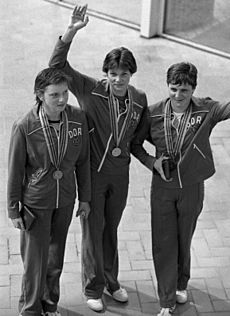
- Vladimir Salnikov (USSR) won three gold medals in swimming. He was the first man to swim the 1500 metre freestyle in under 15 minutes.
- Salnikov also won gold in the 4 × 200 m relay and the 400m freestyle.
- Duncan Goodhew of Great Britain won the 100 metres breaststroke.
- Sweden's Bengt Baron won gold in the 100 meter backstroke.
- In the men's 4 × 100 metres medley relay, all eight teams in the final broke their country's national record.
- The first Australian gold medal since 1972 came in the 4 × 100 men's medley relay.
- East German women were very strong in swimming, winning nine of eleven individual titles. They also won both relays and set 6 world records. Their success was later linked to special training programs.
- Barbara Krause (East Germany) was the first woman to swim the 100 m freestyle in under 55 seconds.
- Backstroker Rica Reinisch (East Germany) broke world records in both the 100m and 200m backstroke, winning gold.
- Petra Schneider (East Germany) broke the world record in the 400m medley.
- The Soviet women won all three medals in the 200m breaststroke. Lina Kačiušytė won the gold.
- Michelle Ford (Australia) won the 800m freestyle, finishing more than four seconds ahead of her East German rivals.
- In swimming, 230 national, 22 Olympic, and ten World records were set.
- The youngest male gold medalist was Hungarian swimmer Sándor Wladár, who was 17 years old.
Volleyball
- The USSR teams won both the men's and women's volleyball gold medals.
Water Polo
- Hungary won a bronze medal in water polo. They had won a medal in this event in every Olympics since 1928.
Weightlifting
- The weightlifting competition was very high level. There were eighteen senior world records, two junior world records, and over 100 Olympic records set.
- Yurik Vardanyan (USSR) was the first middleweight to lift more than 400 kg, winning gold.
- Soviet weightlifters won 5 gold medals.
- The new 100 kg weightlifting category was won by Ota Zaremba of Czechoslovakia.
Wrestling
- In Greco-Roman wrestling, Ferenc Kocsis of Hungary won the 163 pound class.
- Soviet wrestlers won 12 gold medals.
Closing Ceremony
Because of the U.S. boycott, some parts of the closing ceremony were changed. Usually, the Olympic flag is passed to the mayor of the next host city. But for the 1984 Summer Olympics in Los Angeles, the flag of Los Angeles was raised instead of the U.S. flag. The Olympic Anthem was played instead of the U.S. national anthem. The Olympic flag was kept by Moscow until 1984. There was no presentation for the next host city.
The opening and closing ceremonies were shown in the 1981 film Oh, Sport – You Are The World!
Olympic Venues
The Games used many different places for events:
- Central Lenin Stadium area: This included the Grand Arena for ceremonies, athletics, and football. The Minor Arena was used for volleyball, and the Swimming Pool for water polo. The Sports Palace hosted gymnastics and judo.
- Olympiysky Sports Complex: This had an Indoor Stadium for basketball and boxing, and a Swimming Pool for swimming and diving.
- CSKA Sports Complex: This complex hosted wrestling, fencing, and more basketball.
- Other Moscow Venues: These included Dynamo Central Stadium for football and field hockey, and the Trade Unions' Equestrian Complex for horse riding.
- Krylatskoye Sports Complex: This area had a basin for canoeing and rowing, a velodrome for cycling, and a field for archery.
- Venues outside Moscow: Some football games were held in Leningrad, Minsk, and Kiev. Sailing events took place in Tallinn, Estonia.
Medals Awarded
The 1980 Summer Olympics had 203 events in 21 sports:
- Aquatics
- Diving (4)
- Swimming (26)
- Water polo (1)
- Archery (2)
- Athletics (38)
- Basketball (2)
- Boxing (11)
- Canoeing (11)
- Cycling
- Road (2)
- Track (4)
- Equestrian
- Dressage (2)
- Eventing (2)
- Show jumping (2)
- Fencing (8)
- Football (1)
- Gymnastics (14)
- Handball (2)
- Field hockey (2)
- Judo (8)
- Modern pentathlon (2)
- Rowing (14)
- Sailing (6)
- Shooting (7)
- Volleyball (2)
- Weightlifting (10)
- Wrestling
- Freestyle (10)
- Greco-Roman (10)
Event Schedule
- All times are in Moscow Time (UTC+3)
| ● | Opening ceremony | Event competitions | ● | Event finals | ● | Closing ceremony |
| Date | July | August | ||||||||||||||
|---|---|---|---|---|---|---|---|---|---|---|---|---|---|---|---|---|
| 19th Sat |
20th Sun |
21st Mon |
22nd Tue |
23rd Wed |
24th Thu |
25th Fri |
26th Sat |
27th Sun |
28th Mon |
29th Tue |
30th Wed |
31st Thu |
1st Fri |
2nd Sat |
3rd Sun |
|
| Archery | ● ● | |||||||||||||||
| Athletics | ● ● ● |
● ● ● |
● ● ● ● ● |
● ● ● ● |
● ● ● ● ● |
● ● ● ● ● |
● ● ● |
● ● ● ● ● ● ● ● ● ● |
||||||||
| Basketball | ● ● | |||||||||||||||
| Boxing | ● ● ● ● ● ● ● ● ● ● ● |
|||||||||||||||
| Canoeing | ● ● ● ● ● ● |
● ● ● ● ● |
||||||||||||||
| Cycling | ● | ● | ● | ● ● | ● | |||||||||||
| Diving | ● | ● | ● | ● | ||||||||||||
| Equestrian | ● ● | ● | ● | ● | ● | |||||||||||
| Fencing | ● | ● | ● | ● | ● | ● | ● | ● | ||||||||
| Field hockey | ● | ● | ||||||||||||||
| Football (soccer) | ● | |||||||||||||||
| Gymnastics | ● | ● | ● ● | ● ● ● ● ● ● ● ● ● ● |
||||||||||||
| Handball | ● ● | |||||||||||||||
| Judo | ● | ● | ● | ● | ● | ● | ● | ● | ||||||||
| Modern pentathlon | ● ● | |||||||||||||||
| Rowing | ● ● ● ● ● ● |
● ● ● ● ● ● ● ● |
||||||||||||||
| Sailing | ● ● ● ● ● ● |
|||||||||||||||
| Shooting | ● | ● | ● | ● | ● | ● | ● | |||||||||
| Swimming | ● ● | ● ● ● ● |
● ● ● |
● ● ● ● |
● ● ● ● |
● ● ● ● |
● ● ● ● ● |
|||||||||
| Volleyball | ● | ● | ||||||||||||||
| Water polo | ● | |||||||||||||||
| Weightlifting | ● | ● | ● | ● | ● | ● | ● | ● | ● | ● | ||||||
| Wrestling | ● ● ● |
● ● ● |
● ● ● ● |
● ● ● |
● ● ● |
● ● ● ● |
||||||||||
| Total gold medals | 5 | 7 | 10 | 12 | 19 | 15 | 22 | 22 | 10 | 16 | 14 | 11 | 19 | 20 | 1 | |
| Ceremonies | ● | ● | ||||||||||||||
| Date | 19th Sat |
20th Sun |
21st Mon |
22nd Tue |
23rd Wed |
24th Thu |
25th Fri |
26th Sat |
27th Sun |
28th Mon |
29th Tue |
30th Wed |
31st Thu |
1st Fri |
2nd Sat |
3rd Sun |
| July | August | |||||||||||||||
Medal Winners
This is a list of all nations that won medals at the 1980 Games.
* Host nation (Host nation (Soviet Union))
| Rank | Nation | Gold | Silver | Bronze | Total |
|---|---|---|---|---|---|
| 1 | 80 | 69 | 46 | 195 | |
| 2 | 47 | 37 | 42 | 126 | |
| 3 | 8 | 16 | 17 | 41 | |
| 4 | 8 | 7 | 5 | 20 | |
| 5 | 8 | 3 | 4 | 15 | |
| 6 | 7 | 10 | 15 | 32 | |
| 7 | 6 | 6 | 13 | 25 | |
| 8 | 6 | 5 | 3 | 14 | |
| 9 | 5 | 7 | 9 | 21 | |
| 10 | 3 | 14 | 15 | 32 | |
| 11 | 3 | 3 | 6 | 12 | |
| 12 | 3 | 1 | 4 | 8 | |
| 13 | 2 | 3 | 9 | 14 | |
| 14 | 2 | 3 | 4 | 9 | |
| 15 | 2 | 2 | 5 | 9 | |
| 16 | 2 | 1 | 2 | 5 | |
| 17 | 2 | 0 | 2 | 4 | |
| 2 | 0 | 2 | 4 | ||
| 19 | 2 | 0 | 0 | 2 | |
| 20 | 1 | 3 | 2 | 6 | |
| 21 | 1 | 2 | 1 | 4 | |
| 22 | 1 | 0 | 2 | 3 | |
| 23 | 1 | 0 | 0 | 1 | |
| 1 | 0 | 0 | 1 | ||
| 1 | 0 | 0 | 1 | ||
| 26 | 0 | 3 | 2 | 5 | |
| 27 | 0 | 2 | 2 | 4 | |
| 28 | 0 | 2 | 0 | 2 | |
| 29 | 0 | 1 | 3 | 4 | |
| 30 | 0 | 1 | 2 | 3 | |
| 31 | 0 | 1 | 1 | 2 | |
| 32 | 0 | 1 | 0 | 1 | |
| 0 | 1 | 0 | 1 | ||
| 34 | 0 | 0 | 3 | 3 | |
| 35 | 0 | 0 | 1 | 1 | |
| 0 | 0 | 1 | 1 | ||
| Totals (36 entries) | 204 | 204 | 223 | 631 | |
Countries and Regions That Participated
The list below shows the countries and regions that took part. The number in parentheses tells you how many athletes were from each nation. Countries in italics competed under the Olympic flag or their National Olympic Committee flags.
| Participating National Olympic Committees |
|---|
^ Note: Liberia, with seven athletes, withdrew after marching in the Opening Ceremony and took part in the boycott. |
- 1980 Summer Paralympics
- 1980 Winter Paralympics
- 1980 Winter Olympics
- Olympic Games celebrated in Russia
- 1980 Summer Olympics – Moscow
- 2014 Winter Olympics – Sochi
- Olympic Games with significant boycotts
- 1976 Summer Olympics – Montreal – African boycott
- 1980 Summer Olympics – Moscow – United States-led boycott
- 1984 Summer Olympics – Los Angeles – Soviet-led boycott
- List of IOC country codes
See also
 In Spanish: Juegos Olímpicos de Moscú 1980 para niños
In Spanish: Juegos Olímpicos de Moscú 1980 para niños
 | Calvin Brent |
 | Walter T. Bailey |
 | Martha Cassell Thompson |
 | Alberta Jeannette Cassell |


